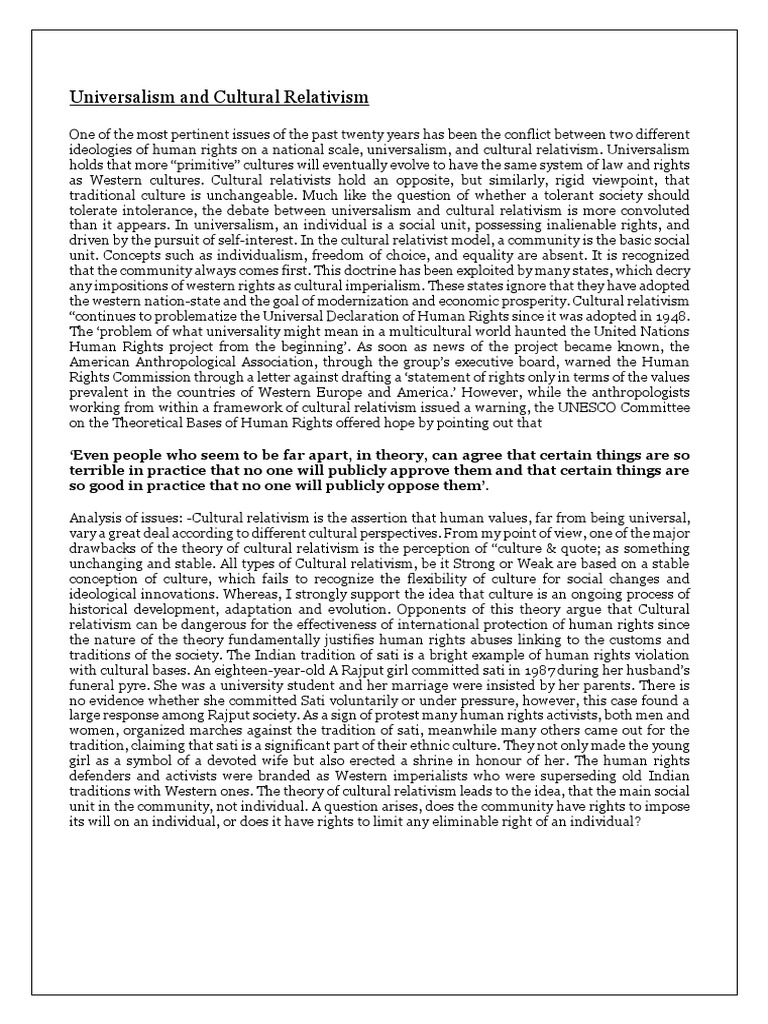In the realm of ethics and philosophy, the frameworks of cultural relativism and moral universalism stand as two opposing paradigms. Each framework offers distinct perspectives on morality, shaping the way societies view human rights, justice, and ethical behavior. Understanding the nuances between these two ideologies not only engages our curiosity but also fosters a deeper appreciation for the complexities of cultural interactions in an increasingly globalized world.
Cultural relativism posits that moral codes and ethical standards are inherently tethered to specific cultural contexts. This idea suggests that what is deemed ‘right’ or ‘wrong’ varies across different societies, influenced by customs, historical experiences, and social norms. For cultural relativists, morality is not an absolute universal concept but is instead fluid and adaptable, morphing with each unique cultural environment. This perspective encourages an open-minded view towards diverse practices and beliefs, positing that no single culture holds a monopoly over morality.
In stark contrast, moral universalism asserts that certain ethical principles hold universally, transcending cultural boundaries. Proponents of this viewpoint argue that there are fundamental rights and wrongs applicable to all human beings, irrespective of cultural context. Universalists maintain that concepts such as justice, equality, and dignity are inherent to human existence. This perspective posits that regardless of cultural differences, certain moral standards should apply universally, aiding in the fight against oppression, inequality, and injustice worldwide.
The implications of these two differing viewpoints are profound. Cultural relativism can promote tolerance and understanding by valuing the intricate tapestry of human cultures. It cautions against ethnocentrism—the tendency to view one’s own culture as superior—thus fostering a more inclusive world view. By appreciating the rich diversity of ethical systems, cultural relativism may encourage meaningful dialogue among diverse groups, facilitating cooperation in addressing global issues such as climate change and humanitarian crises.
However, critics of cultural relativism argue that this framework can lead to moral paralysis. If all moral frameworks are considered equally valid, then it becomes exceedingly challenging to challenge practices that may be considered heinous or unjust, such as human rights violations or acts of discrimination. This highlights a potential pitfall: the risk of condoning harmful practices under the guise of cultural preservation. The question emerges: at what point does cultural respect become complicity in ethical transgressions?
Moral universalism, on the other hand, often faces scrutiny for its potential to impose a homogenous set of values on disparate cultures. This imposition can be perceived as a form of neo-colonialism, overshadowing local customs and traditions in favor of a ‘one-size-fits-all’ approach to ethics. Advocates argue that the establishment of universal human rights, such as the Right to Freedom and the Right to Life, can significantly uplift marginalized groups and foster global solidarity against oppressive regimes. Yet, the challenge remains: how to reconcile these universal standards with cultural specificity without eradicating cultural identity?
As the discourse continues, intersections between cultural relativism and moral universalism have emerged. Both paradigms can coexist, prompting a synthesis of ideas where neither cultural practices nor universal ethics are wholly disregarded. Emphasizing dialogue and engagement between cultures offers a pathway to create a hybrid model of ethics. This model allows for the preservation of cultural heritage while recognizing the necessity of universal human rights. By harnessing the strengths of both philosophies, societies can navigate the choppy waters of cultural ethics more effectively, fostering respect, dignity, and justice across borders.
This shift in perspective encourages an exploration of ethics that transcends simplistic categorizations. For instance, global challenges such as climate change reveal the intricacies of morality in a connected world. As the consequences of environmental degradation increasingly affect vulnerable populations worldwide, cultural relativism and moral universalism both make vital contributions to discourses on climate justice. Understanding how different cultures view their relationship with nature can inform more equitable and sustainable solutions to ecological crises.
Moreover, the debates surrounding cultural relativism and moral universalism can be particularly impactful in light of the digital age. The rapid dissemination of information through global networks prompts consideration of how philosophical frameworks respond to challenges that didn’t exist in the past. The digital era offers an unprecedented opportunity for cross-cultural exchanges; however, it simultaneously raises questions about the ethics of representation and the balance of power between cultures. Striking an equilibrium that respects cultural diversity while upholding universal human rights remains a pivotal challenge of our time.
In essence, the dichotomy of cultural relativism and moral universalism presents not merely a theoretical dilemma but a pragmatic necessity. Understanding their divergence not only sharpens our ethical reasoning but illuminates the path towards a more just and humane world. As we engage with these concepts, it is imperative to cultivate curiosity about how they interact within the complexities of our globalized society. The pursuit of cohesive moral principles that respect cultural diversity while championing universal rights offers an enriching avenue for dialogue, collaboration, and ultimately, a more harmonious existence.
